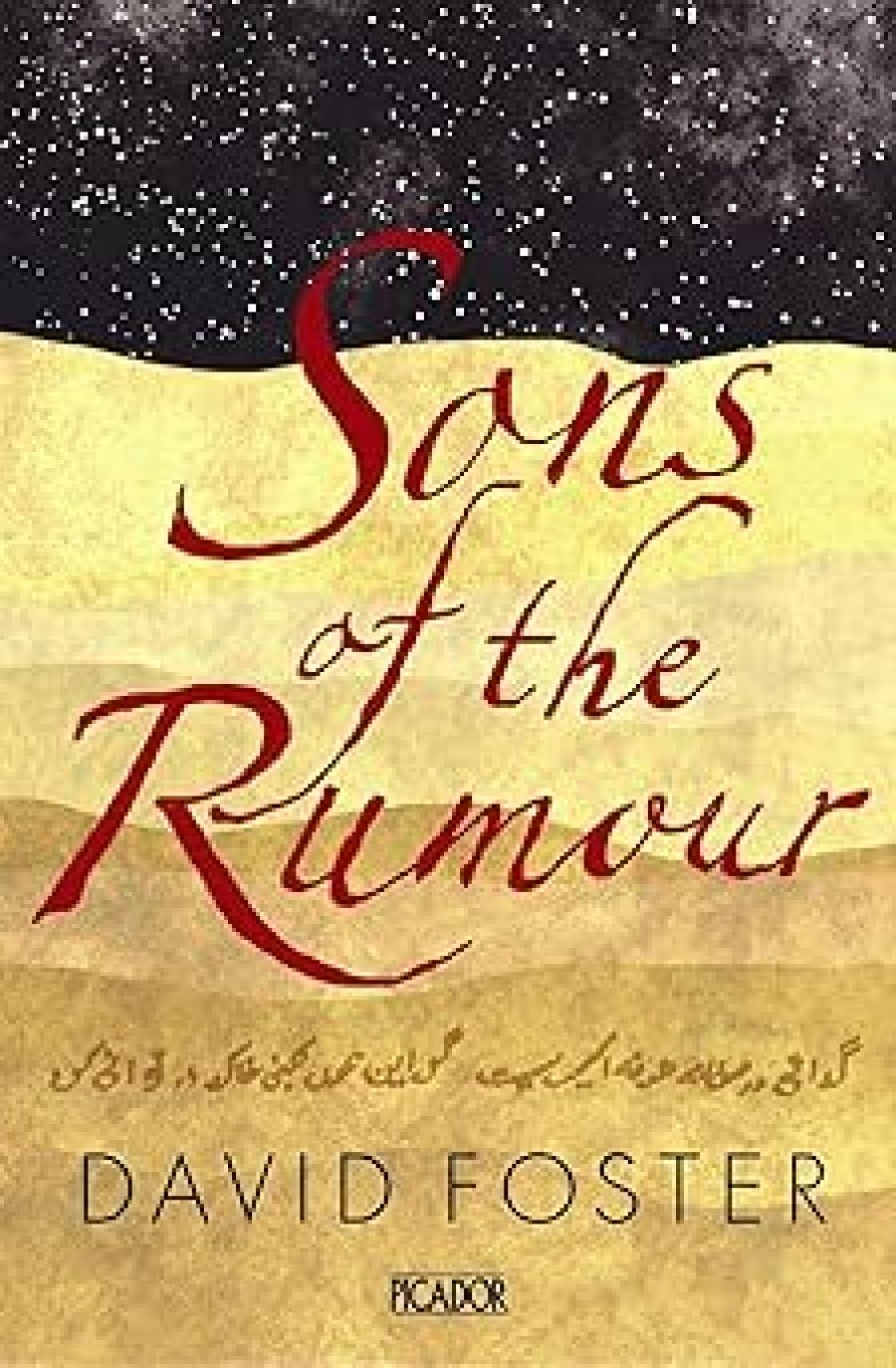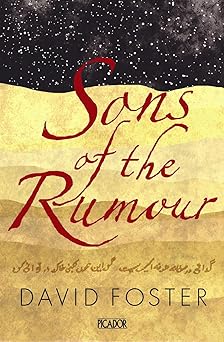
- Free Article: No
- Contents Category: Fiction
- Review Article: Yes
- Article Title: A town called Merv
- Article Subtitle: Brilliant writing from the quixotic David Foster
- Online Only: No
- Custom Highlight Text:
At the end of her insightful critical study David Foster: Satirist of Australia (2008), Susan Lever quotes several rather despondent-sounding letters from her subject. In one, he claims to have lost his taste for satire; in another, he declares that he is ‘over’ literature. Yet he also expresses a continuing desire ‘to write books that are strange and beautiful’, and reveals he is at work on a new novel, his first since The Land Where Stories End (2001), one that draws on the framing tale of Arabian Nights and explores his ‘twin obsessions’: sexuality and mysticism.
- Book 1 Title: Sons of the Rumour
- Book 1 Biblio: Picador, $39.99 hb, 431 pp
- Book 1 Cover Small (400 x 600):

As Lever’s book establishes, Foster has long been preoccupied with these themes, which his fiction depicts as intimately and complexly interconnected. The satirical verve of his writing – which he conceives as an adversarial and distinctly masculine practice – is fuelled by an intelligence as learned as it is irreverent. Foster is a freethinker whose far-reaching and idiosyncratic ideas about the decadence of modern society often place him radically at odds with polite opinion: his work, as Lever observes of one his best novels, Mates of Mars (1991), contains ‘something to offend every reader’. But the provocative, even outrageous, nature of his writing cultivates a duality in its portrayal of religious practices in particular. It depicts the great panoply of human belief systems, and the often bizarre rituals performed in their service, as preposterous – ‘The things people believe!’ blurts one of Sons of the Rumour’s many narrators – but it also sees them as manifestations of something necessary and valid.
Sons of the Rumour, Foster’s fourteenth novel, is his most substantial and brilliant work since The Glade within the Grove (1996). A roiling, hilarious, pan-theological satire, it is also very much an extension of the themes that have driven his remarkable fiction for more than four decades. The novel is explicitly concerned with the interaction between the ‘Two Worlds’ of spirit and flesh. It deploys Foster’s formidable erudition to this end, quoting from a dizzying array of religious texts from a host of different traditions. The many stories it contains anatomise, in a comical and sometimes brutal fashion, the ways in which sexual desire and religious belief inform and distort each other. Both the absurdity and the necessity of the process derive from the need to resolve, or at least regulate, the inevitable complications that follow from what Foster considers to be the essential and radically different natures of men and women. The sacred, for Foster, has a distinctly earthy and somewhat paradoxical quality. ‘All religions,’ declares one of the novel’s seers, ‘are attempts, more or less unsuccessful, to describe One Truth’, before going on to observe that they ‘seem to work in practice but not in theory’.
Sons of the Rumour bases itself on two literary models. The first, as Foster intimated to Lever, is indeed Arabian Nights. The framing narrative, ‘Iranian Days’, assumes the point of view of the Shahrban – more familiarly the Shah – to whom Shahrazad (Foster’s preferred spelling) tells her tales. Distracted by her stupendous breasts and bored by her endless stories (‘If one more fisherman,’ he complains, ‘opens one more trapdoor about which one more spider has pitched one more web-tent to reveal one more ensorcelled hoard in one more treasury with the aid of one more bottle-imp ...’), the Shah ventures into the streets of his wonderfully named hometown of Merv, which is the ‘centre of the textile trade’ and thus a cultural crossroads. He is in need of advice about his marital difficulties, because Shahrazad’s forceful personality has exacerbated his desires, insecurities and jealousies, complicating his customary means of interacting with women – namely, a convenient cycle of deflowerings and decapitations. As the novel unfolds, the Shah encounters a series of men, of various nationalities and faiths, each of whom tells him a tale followed by a brief explanatory sermon. Collectively, these illuminate the elusive nature of novel’s defining theme: what one of the Sons of the Rumour sums up as ‘happiness and the pursuit of happiness ... how one person can possibly retain it, though all, despite themselves, pursue it’.
The novel’s second antecedent, less overt but perhaps no less significant, is James Joyce’s Ulysses (1922), from which Sons of the Rumour borrows its narrative shape. Both are episodic novels that describe the experiences of a man of middle years who is estranged from his sexually assertive spouse; both novels climax in a long, virtuosic chapter of visionary intensity; both are resolved, quite movingly, on a note of domestic reconciliation and harmony.
The conflation of these two sources – one modern and Western, the other pre-modern and Eastern – gives some indication of the novel’s underlying interest. In an endnote, Foster explains that Sons of the Rumour was prompted by the 2005 Cronulla riots. His premise ‘is that a major flashpoint now exists between (fundamentalist) Islamic man and (anti-Christian) secular woman’. His exploration of this idea proceeds, in a roundabout and characteristically irreverent fashion, through the novel’s witty inversions. In Arabian Nights, Shahrazad’s stories are acts of deferral; they are cunning distractions by which she hopes to avoid execution and surreptitiously bring her captor to the realisation of his cruelty. By overturning this perspective, Sons of the Rumour offers itself as a masculine alternative to Shahrazad’s feminine wiles, inscribing a quest into the story cycle as the Shah seeks a solution to the problem of his discontentment. The pre-modern setting, too, is undercut by deliberate anachronisms and by the fact that Foster’s ninth-century Iranians all speak fluent Strine. And the personal difficulties between the Shah and Shahrazad are to a significant extent a consequence of their being a curiously modern couple. To quote Shahrazad’s pithy assessment of their respective characters: ‘you’re a big girl’s blouse and I’m a bit acca-dacca.’
The novel’s apotheosis comes when the overwhelmed Shah swoons, bangs his head and has a vision of the future. In the book’s longest chapter, which is one of the most brilliantly sustained pieces of writing I have encountered in I do not know how long, the narrative upends itself, jumping forward to 2007 to assume the point of view of an Irish-Jewish jazz drummer in his early sixties, named Al Morrissey. His mother is suffering from dementia; his marriage is breaking down. The chapter follows him on a ‘pilgrimage’ to Ireland, during which he is led to reflect upon his life: his many regrets, failures and disappointments. It is a searching and richly complex piece of writing: a tour de force that is at once contemplative and passionate. In reflecting many of the themes implicit in the Iranian sections from a contemporary perspective, it draws together the novel’s various concerns, combining its more intimate musings with a pessimistic essay about the conflicting pressures and cultural tensions inherent in modern secularism. Significantly, it does so in a way that explicitly evokes a number of motifs from Foster’s earlier work.
Buried in Sons of the Rumour’s final tale – which features a truly horrific scene that no reader is likely to forget in a hurry – is an allusion to Foster’s first novel, The Pure Land (1974). This harking back underscores the impression that the book’s wide-ranging inquiry is also a summation that casts his quixotic, ongoing quarrel with the corruptions of the modern world as a single intellectual and spiritual quest. In its command of its material and its sheer vitality, Sons of the Rumour represents an extraordinary addition to Foster’s already remarkable oeuvre. Strange and beautiful might be two words to describe it, but that barely begins to convey the novel’s range of invention.
Attempt to characterise Foster’s writing and eventually one will run out of adjectives. There is simply no one remotely like him in contemporary Australian fiction. He is so far ahead of everyone else that it’s not funny. Except it is funny – very, very funny. His bogan Shahrazad is a scream. Foster has never been reluctant to announce the fact that he believes his work to be superior – that he is operating on a creative and intellectual plane inaccessible to most novelists – which is shamelessly egotistical of him, but he’s right.


Comments powered by CComment